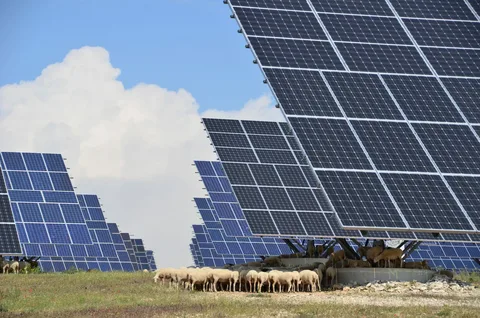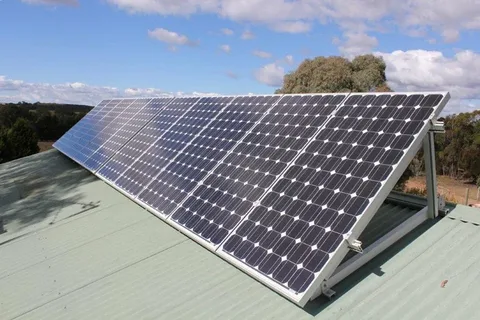Are you tired of paying expensive electricity bills each month? If you are, consider investing in a stand-alone solar system. Stand-alone solar systems allow homeowners to generate electricity and save money on utility bills. Additionally, many other benefits come with buying a stand alone solar system. This blog post will discuss those benefits and explain why you must switch.
Lower Electricity Costs
One of the most significant benefits of purchasing a stand-alone solar system is the potential for lower electricity costs. Traditional electricity bills can quickly add up, especially during peak usage months. However, with a stand-alone solar system, you can significantly reduce or even eliminate your reliance on grid electricity, leading to substantial savings.
When you generate your solar power, you no longer need electricity from utility companies. Instead, you can harness the sun’s energy to power your home or business. It means that you can drastically reduce your electricity bills or, in some cases, eliminate them.
Furthermore, with advancements in solar technology, stand-alone solar systems can generate more electricity than ever. This excess energy can be stored in batteries or sold back to the grid through net metering programs. You can earn credits or money to further reduce your overall electricity costs by selling extra power.
In addition to lower electricity bills, a stand-alone solar system can give you more control over your energy usage. A traditional grid-tied system determines your electricity usage by the utility company’s rates. However, with a stand-alone system, you can become more aware of your energy consumption and make conscious choices to conserve energy. It not only helps reduce costs but also benefits the environment.
Overall, investing in a stand-alone solar system can significantly save your electricity bills. By generating your solar power, you can take control of your energy usage and enjoy the financial benefits that come with it.
Energy Independence
Energy independence is one of the most significant benefits of a stand-alone solar system. Relying on traditional electricity providers can be stressful and expensive, especially if there are power outages or price hikes. However, a stand-alone solar system allows homeowners to generate electricity, giving them complete control over their energy supply.
With a stand-alone solar system, you are no longer at the mercy of utility companies. You won’t have to worry about price increases, unexpected power outages, or waiting for repairs. You will have a reliable and consistent electricity source that you can always rely on.
This independence can significantly benefit those living in remote areas or off the grid. It also provides security during natural disasters or other emergencies, as you can still access power.
Overall, energy independence is a critical aspect of a stand-alone solar system. It gives homeowners the peace of mind of controlling their energy source and not relying on external providers.
Environmental Benefits
One of the most significant advantages of investing in a stand-alone solar system is its environmental benefits. By harnessing the sun’s power, you reduce your carbon footprint and contribute to a cleaner and healthier planet.
Solar energy is a clean and renewable source of power. Unlike traditional energy sources, such as fossil fuels, solar energy does not emit greenhouse gases or other pollutants into the atmosphere. It means that using a stand-alone solar system directly reduces your impact on climate change.
Furthermore, solar power helps to conserve water. Traditional electricity generation methods, such as coal-fired power plants, require much water for cooling. With solar energy, no water is needed for operation, allowing for preserving this precious resource.
Another environmental benefit of stand-alone solar systems is the reduction of air pollution. Fossil fuel power plants release harmful pollutants, such as sulphur dioxide, nitrogen oxides, and particulate matter, contributing to respiratory problems, smog, and acid rain. By using solar energy, you are improving the air quality in your immediate surroundings and helping mitigate the adverse health effects of air pollution.
In summary, investing in a stand-alone solar system provides significant environmental benefits. By reducing your reliance on traditional energy sources, you are helping to combat climate change, conserve water, and improve air quality. By making the switch to solar power, you are not only benefiting yourself financially but also making a positive impact on the world we live in.
Increased Property Value
One of the lesser-known benefits of investing in a stand-alone solar system is the increased property value it brings. As more and more homeowners become aware of the benefits of solar energy, they are actively seeking properties with existing solar systems in place. It means that by installing a stand-alone solar system, you are instantly boosting the value of your property.
Studies have shown that homes with solar systems have a higher resale value than those without. Potential buyers are attracted to saving on electricity bills and reducing their carbon footprint. A recent study by the Lawrence Berkeley National Laboratory found that homes with solar panels sold for about 4% more than similar homes without solar.
Furthermore, a stand-alone solar system gives potential buyers a sense of security and independence. It signifies that the property is equipped with a reliable and sustainable energy source, reducing the reliance on traditional power sources. This peace of mind is a significant selling point for many homeowners and can significantly increase the desirability of your property.
So, not only do you get to enjoy the benefits of lower electricity costs and environmental sustainability, but you also have the added advantage of increasing your property value. Investing in a stand-alone solar system is a wise financial decision and sets your property apart in a competitive market.
Stand Alone Power System Provides Reliability And Durability
One of the most attractive aspects of purchasing a stand alone power system is its reliability and durability. Unlike traditional electricity sources susceptible to outages and interruptions, a stand-alone power system provides a reliable and uninterrupted energy source.
Solar panels are designed to withstand harsh weather conditions such as strong winds, heavy rain, and extreme temperatures. Even during storms or adverse weather events, your stand-alone solar system will continue to generate electricity, providing you with a consistent and reliable power supply.
In addition to being highly durable, stand-alone solar systems require minimal maintenance. Unlike generators or traditional electricity sources that require regular upkeep and servicing, solar panels only require occasional cleaning to ensure optimal performance. It saves you time and effort and reduces maintenance costs in the long run.
Furthermore, a stand-alone power system is not dependent on fossil fuels, which can be subject to price fluctuations and supply disruptions. With a solar system, you control your energy production, making you less vulnerable to rising electricity costs.
Overall, the reliability and durability of a stand-alone solar system provide peace of mind and long-term stability. By investing in this renewable energy source, you can be confident that you will have a consistent and dependable power supply for years.
Remote Location Suitability
One of the most significant advantages of investing in a stand-alone solar system is its suitability for remote locations. Traditional electricity grids may only sometimes be able to reach remote areas, leaving residents with limited access to electricity. Stand-alone solar systems, however, can provide reliable and sustainable energy no matter where you are.
Whether you live off the grid or in a remote location, a stand-alone solar system can meet your energy needs without needing a connection to the electricity grid. It is particularly beneficial for those living in areas prone to power outages or for those looking for energy independence.
Furthermore, stand-alone solar systems can also be installed in areas where it may be difficult or expensive to run electricity lines. This makes them ideal for people living in remote locations or rural properties.
Overall, the remote location suitability of a stand-alone solar system is a significant advantage that provides reliable, sustainable energy in areas where traditional power grids cannot reach.
Government Incentives And Tax Credits
Governments around the world are keen to encourage the adoption of solar power. As such, numerous financial incentives and tax credits are available for homeowners who switch to a stand-alone solar system.
In the United States, the federal government offers a 26% tax credit for residential solar installations until 2022, which can significantly reduce the upfront costs of a solar system. In addition, many states offer additional incentives, such as rebates and net metering programs, which can further increase the financial benefits of a stand-alone solar system.
Other countries offer similar programs to encourage the adoption of solar power, with some offering generous feed-in tariffs for homeowners who generate excess energy to sell back to the grid. For example, Australia offers a Small-scale Renewable Energy Scheme, which provides homeowners with a financial benefit for the amount of energy generated by their solar system.
With these government incentives and tax credits, investing in a stand-alone solar system can be an affordable and practical choice for homeowners looking to reduce their energy costs and minimize their environmental impact.
Long-Term Cost Savings
One of the most compelling reasons to invest in a stand-alone solar system is its long-term cost savings. While the upfront cost may seem daunting, the savings over time make it a wise financial decision.
Your electricity costs will significantly decrease once you have installed a stand-alone solar system. You will generate your own clean and renewable energy, so you won’t have to rely as heavily on the grid. It will lead to lower monthly electricity bills and protection against rising energy costs in the future.
Additionally, a stand-alone solar system’s maintenance and operating costs are minimal. Solar panels are durable and require very little maintenance, so you won’t have to spend much on repairs or replacements. With proper care, solar panels can last for decades, ensuring long-term cost savings.
Furthermore, investing in a stand-alone solar system can protect you against fluctuating energy prices. As fossil fuel prices continue to rise, the cost of electricity from the grid is also expected to increase. You are shielded from these price hikes by generating your energy, providing you with stability and financial security.
Conclusion
If you’re looking for a sustainable way to power your home, a stand-alone solar system is worth considering. It offers a range of benefits that can improve your quality of life, save you money, and protect the environment.
First and foremost, you’ll enjoy lower electricity bills thanks to the abundant energy supply from the sun. It means you can free up more cash for other essential expenses and invest in the things that matter most to you.
Additionally, a stand-alone solar system provides energy independence and reliability, even if you live in a remote location. It means you don’t have to worry about power outages or grid failures, as your system will keep working as long as the sun shines.
And let’s remember the environmental benefits of solar energy. Using renewable energy can reduce your carbon footprint, decrease air and water pollution, and protect wildlife and their habitats.
| Other Good Articles to Read |
| Blogs Rain |
| Cme Blog Spot |
| Garcias Blogs |
| Yyc Blogs |
| Guiade Blogs |
| Blogs-Hunt |
| Impact-Blog |
| Smarty Blogs |
| Ed Blog |
| Mo Blogs |
| Blogs Em |
| Blogs T |

